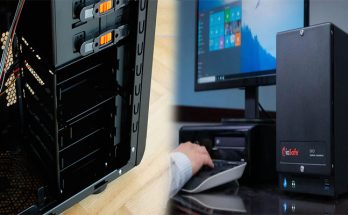If you’re looking to purchase a computer server for your small business, you have several options. You can purchase an on-premise server, but this option requires a larger initial investment since you need to purchase all of the hardware and software. On the other hand, renting a computer server offers flexibility and a lower initial investment, as you only pay for the hardware and software you need.
Moreover, renting a server means you won’t have to commit to a long-term lease.
Cloud-based server
Cloud-based computer servers offer the advantages of having a local server without the costs of maintaining it. This option is great for small businesses that need access to their data anywhere in the world. Moreover, cloud servers help promote remote collaboration and provide secure access to business information. With a cloud server for small business, you can focus on the core activities of your business instead of worrying about the IT side of things.
Cloud-based servers can be created by utilizing a virtualized model. These services use software that abstracts physical server resources and deliver them over the Internet. This can be done within an organization, across organizations, or even in the public cloud.
Rack-mountable server
If you are a small business owner, you may want to consider purchasing a rack- mountable computer server. A server manages the entire computer system, from emails and financial information to operating software and printers. A server will have varying amounts of storage and memory, depending on your company’s needs. It will also have a number of cores, which are similar to CPUs. A 10-core processor works like ten CPUs, so you’ll want to choose a server with a higher number of cores.
A typical rack-mountable computer server comes in 1U to 4U sizes. These servers can accommodate one to two processors and up to four gigabytes of RAM. They typically feature two network ports. One rack-mountable server can hold up to 42 servers, which means you can pack a lot of punch into a small space.
Dell R710
If you are in the market for a new computer server for your small business, you should consider the Dell R710. The Dell R710 is a powerful and affordable server, starting at $1,998. It also features enhanced virtualization capabilities and energy efficiency. This server comes with innovative system management tools to help you manage and monitor the server’s performance. You can buy individual parts or complete configurations for this model or upgrade it to a more powerful server.
The Dell R710 has a separate network port that allows you to manage the server remotely. It’s linked to the iDRAC Express management controller, which includes a web-based remote console. You can also upgrade to the iDRAC Enterprise
management controller for more advanced features, including support for remote virtual media. In addition, the server comes with a Dell Management Console, based on the extensible Altiris software. You can also integrate it with third-party management tools.
Lenovo ThinkSystem SR3550
The Lenovo ThinkSystem SR3550 is a 2U rackmount computer server that is ideal for small businesses that are on a budget. It offers a high storage capacity and is highly scalable. It features multiple hot-swappable hard drive bays and supports software RAID. It also comes with dual second-generation Intel Xeon Platinum processors.
This server is highly effective for many different tasks, but its one limitation is that it does not include an operating system. This means that it cannot run Apple OS x. In addition, this server comes with an integrated HP lights-out controller and offers compatibility with inter-OS. It also features a removable motherboard and easily accessible memory slots.
phoenixNAP’s Flex servers
The flexibility of Flex servers makes them a great choice for small businesses. With up to two processors, they can be configured to suit a wide range of workloads.
PhoenixNAP also offers a range of value-added services, including Elasticsearch, which provides a secure, easy-to-use way to manage large amounts of data. In addition, their data center is PCI DSS-validated and SOC Type 1 and SOC Type 2 audited.
FlexServers can support changing or intensive workloads and leverage customizable Intel(r) Speed Select Technology to enable easy configuration changes without hardware or software changes. This allows companies to take advantage of significant cost-savings without compromising on performance.



